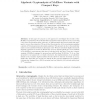Free Online Productivity Tools
i2Speak
i2Symbol
i2OCR
iTex2Img
iWeb2Print
iWeb2Shot
i2Type
iPdf2Split
iPdf2Merge
i2Bopomofo
i2Arabic
i2Style
i2Image
i2PDF
iLatex2Rtf
Sci2ools
142
click to vote
EUROCRYPT
2010
Springer
2010
Springer
Algebraic Cryptanalysis of McEliece Variants with Compact Keys
In this paper we propose a new approach to investigate the security of the McEliece cryptosystem. We recall that this cryposystem relies on the use of error-correcting codes. Since its invention thirty years ago, no efficient attack had been devised that managed to recover the private key. We prove that the private key of the cryptosystem satisfies a system of bi-homogeneous polynomial equations. This property is due to the particular class of codes considered which are alternant codes. We have used these highly structured algebraic equations to mount an efficient key-recovery attack against two recent variants of the McEliece cryptosystems that aim at reducing public key sizes. These two compact variants of McEliece managed to propose keys with less than 20,000 bits. To do so, they proposed to use quasi-cyclic or dyadic structures. An implementation of our algebraic attack in the computer algebra system Magma allows to find the secret-key in a negligible time (less than one second) ...
Bi-homogeneous Polynomial Equations | Cryptology | EUROCRYPT 2010 | Mceliece Cryptosystem | Private Key |
| Added | 19 Jul 2010 |
| Updated | 19 Jul 2010 |
| Type | Conference |
| Year | 2010 |
| Where | EUROCRYPT |
| Authors | Jean-Charles Faugère, Ayoub Otmani, Ludovic Perret, Jean-Pierre Tillich |
Comments (0)

